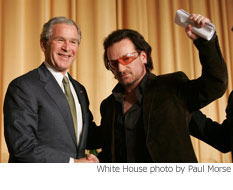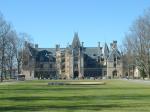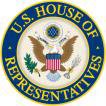
What follows is the complete transcript from the sermon delivered by rock star and leader of the band U2, Bono at this year's National Prayer Breakfast in Washington, DC. You gotta read this one!
Or, to see it online visit this site:
http://www.cnn.com/video/partners/clickability/index.html?url=/video/us/2006/02/02/bono.speaks.cnn______________________________
If you're wondering what I'm doing here, at a prayer breakfast, well, so am I. I'm certainly not here as a man of the cloth, unless that cloth is leather. It's certainly not because I'm a rock star. Which leaves one possible explanation: I'm here because I've got a messianic complex.
Yes, it's true. And for anyone who knows me, it's hardly a revelation.
Well, I'm the first to admit that there's something unnatural...something unseemly...about rock stars mounting the pulpit and preaching at presidents, and then disappearing to their villas in the south of France. Talk about a fish out of water. It was weird enough when Jesse Helms showed up at a U2 concert...but this is really weird, isn't it?
You know, one of the things I love about this country is its separation of church and state. Although I have to say: in inviting me here, both church and state have been separated from something else completely: their mind.
Mr. President, are you sure about this?
It's very humbling and I will try to keep my homily brief. But be warned - I'm Irish.
I'd like to talk about the laws of man, here in this city where those laws are written. And I'd like to talk about higher laws. It would be great to assume that the one serves the other; that the laws of man serve these higher laws...but of course, they don't always. And I presume that, in a sense, is why you're here.
I presume the reason for this gathering is that all of us here - Muslims, Jews, Christians - all are searching our souls for how to better serve our family, our community, our nation, our God.
I know I am. Searching, I mean. And that, I suppose, is what led me here, too.
Yes, it's odd, having a rock star here - but maybe it's odder for me than for you.
You see, I avoided religious people most of my life. Maybe it had something to do with having a father who was Protestant and a mother who was Catholic in a country where the line between the two was, quite literally, a battle line. Where the line between church and state was...well, a little blurry, and hard to see.
I remember how my mother would bring us to chapel on Sundays... and my father used to wait outside. One of the things that I picked up from my father and my mother was the sense that religion often gets in the way of God.
For me, at least, it got in the way. Seeing what religious people, in the name of God, did to my native land...and in this country, seeing God's second-hand car salesmen on the cable TV channels, offering indulgences for cash...in fact, all over the world, seeing the self-righteousness roll down like a mighty stream from certain corners of the religious establishment...
I must confess, I changed the channel. I wanted my MTV.
Even though I was a believer.
Perhaps because I was a believer.
I was cynical...not about God, but about God's politics. (There you are, Jim [speaking to Jim Wallis of Sojourners Magazine])
Then, in 1997, a couple of eccentric, septuagenarian British Christians went and ruined my shtick - my reproachfulness. They did it by describing the millennium, the year 2000, as a Jubilee year, as an opportunity to cancel the chronic debts of the world's poorest people. They had the audacity to renew the Lord's call - and were joined by Pope John Paul II, who, from an Irish half-Catholic's point of view, may have had a more direct line to the Almighty.
'Jubilee' - why 'Jubilee'?
What was this year of Jubilee, this year of our Lord's favor?
I'd always read the scriptures, even the obscure stuff. There it was in Leviticus (25:35)...
'If your brother becomes poor,' the scriptures say, 'and cannot maintain himself...you shall maintain him.... You shall not lend him your money at interest, not give him your food for profit.'
It is such an important idea, Jubilee, that Jesus begins his ministry with this. Jesus is a young man, he's met with the rabbis, impressed everyone, people are talking. The elders say, he's a clever guy, this Jesus, but he hasn't done much...yet. He hasn't spoken in public before...
When he does, is first words are from Isaiah: 'The Spirit of the Lord is upon me,' he says, 'because He has anointed me to preach good news to the poor.' And Jesus proclaims the year of the Lord's favour, the year of Jubilee (Luke 4:18).
What he was really talking about was an era of grace - and we're still in it.
So fast-forward 2,000 years. That same thought, grace, was made incarnate - in a movement of all kinds of people. It wasn't a bless-me club... it wasn't a holy huddle. These religious guys were willing to get out in the streets, get their boots dirty, wave the placards, follow their convictions with actions...making it really hard for people like me to keep their distance. It was amazing. I almost started to like these church people.
But then my cynicism got another helping hand.
It was what Colin Powell, a five-star general, called the greatest W.M.D. of them all: a tiny little virus called AIDS. And the religious community, in large part, missed it. The ones that didn't miss it could only see it as divine retribution for bad behavior. Even on children...even [though the] fastest growing group of HIV infections were married, faithful women.
Aha, there they go again! I thought to myself judgmentalism is back!
But in truth, I was wrong again. The church was slow but the church got busy on this the leprosy of our age.
Love was on the move.
Mercy was on the move.
God was on the move.
Moving people of all kinds to work with others they had never met, never would have cared to meet...conservative church groups hanging out with spokesmen for the gay community, all singing off the same hymn sheet on AIDS...soccer moms and quarterbacks...hip-hop stars and country stars. This is what happens when God gets on the move: crazy stuff happens!
Popes were seen wearing sunglasses!
Jesse Helms was seen with a ghetto blaster!
Crazy stuff. Evidence of the spirit.
It was breathtaking. Literally. It stopped the world in its tracks.
When churches started demonstrating on debt, governments listened - and acted.
When churches starting organizing, petitioning, and even - that most unholy of acts today, God forbid, lobbying...on AIDS and global health, governments listened - and acted.
I'm here today in all humility to say: you changed minds; you changed policy; you changed the world.
Look, whatever thoughts you have about God, who He is or if He exists, most will agree that if there is a God, He has a special place for the poor.
In fact, the poor are where God lives.
Check Judaism. Check Islam. Check pretty much anyone.
I mean, God may well be with us in our mansions on the hill. I hope so. He may well be with us as in all manner of controversial stuff. Maybe, maybe not.
But the one thing we can all agree, all faiths and ideologies, is that God is with the vulnerable and poor.
God is in the slums, in the cardboard boxes where the poor play house.
God is in the silence of a mother who has infected her child with a virus that will end both their lives.
God is in the cries heard under the rubble of war.
God is in the debris of wasted opportunity and lives, and God is with us if we are with them.
"If you remove the yoke from your midst, the pointing of the finger and speaking wickedness, and if you give yourself to the hungry and satisfy the desire of the afflicted, then your light will rise in darkness and your gloom with become like midday and the Lord will continually guide you and satisfy your desire in scorched places."
It's not a coincidence that in the scriptures, poverty is mentioned more than 2,100 times. It's not an accident. That's a lot of air time, 2,100 mentions. (You know, the only time Christ is judgmental is on the subject of the poor.)
'As you have done it unto the least of these my brethren, you have done it unto me' (Matthew 25:40).
As I say, good news to the poor.
Here's some good news for the president.
After 9/11 we were told America would have no time for the world's poor. America would be taken up with its own problems of safety. And it's true these are dangerous times, but America has not drawn the blinds and double-locked the doors.
In fact, you have doubled aid to Africa. You have tripled funding for global health. Mr. President, your emergency plan for AIDS relief and support for the Global Fund - you and Congress - have put 700,000 people onto life-saving anti-retroviral drugs and provided 8 million bed nets to protect children from malaria.
Outstanding human achievements. Counterintuitive. Historic. Be very, very proud.
But here's the bad news. From charity to justice, the good news is yet to come. There is much more to do. There's a gigantic chasm between the scale of the emergency and the scale of the response.
And finally, it's not about charity after all, is it? It's about justice.
Let me repeat that: It's not about charity, it's about justice.
And that's too bad.
Because you're good at charity.
Americans, like the Irish, are good at it.
We like to give, and we give a lot, even those who can't afford it.
But justice is a higher standard.
Africa makes a fool of our idea of justice; it makes a farce of our idea of equality. It mocks our pieties, it doubts our concern, it questions our commitment.
Sixty-five hundred Africans are still dying every day of a preventable, treatable disease, for lack of drugs we can buy at any drug store. This is not about charity, this is about justice and equality.
Because there's no way we can look at what's happening in Africa and, if we're honest, conclude that deep down, we really accept that Africans are equal to us. Anywhere else in the world, we wouldn't accept it.
Look at what happened in South East Asia with the tsunami--150,000 lives lost to that misnomer of all misnomers, "mother nature." In Africa, 150,000 lives are lost every month.
A tsunami every month. And it's a completely avoidable catastrophe.
It's annoying but justice and equality are mates. Aren't they? Justice always wants to hang out with equality.
And equality is a real pain.
You know, think of those Jewish sheep-herders going to meet the Pharaoh, mud on their shoes, and the Pharaoh says, "Equal?" A preposterous idea: rich and poor are equal?
And they say, "Yeah, 'equal,' that's what it says here in this book. We're all made in the image of God."
And eventually the Pharaoh says, "OK, I can accept that. I can accept the Jews - but not the blacks."
"Not the women. Not the gays. Not the Irish. No way, man."
So on we go with our journey of equality.
On we go in the pursuit of justice.
We hear that call in the ONE Campaign, a growing movement of more than 2 million Americans...Left and Right together... united in the belief that where you live should no longer determine whether you live.
We hear that call even more powerfully today, as we mourn the loss of Coretta Scott King - mother of a movement for equality, one that changed the world but is only just getting started.
These issues are as alive as they ever were; they just change shape and cross the seas.
Preventing the poorest of the poor from selling their products while we sing the virtues of the free market...that's a justice issue.
Holding children to ransom for the debts of their grandparents...that's a justice issue.
Withholding life-saving medicines out of deference to the Office of Patents...that's a justice issue.
And while the law is what we say it is, God is not silent on the subject.
That's why I say there's the law of the land.
And then there is a higher standard.
There's the law of the land, and we can hire experts to write them so they benefit us, so the laws say it's OK to protect our agriculture but it's not OK for African farmers to do the same, to earn a living?
As the laws of man are written, that's what they say.
God will not accept that.
Mine won't, at least. Will yours?
I close this morning on...very...thin...ice.
This is a dangerous idea I've put on the table: my God vs. your God, their God vs. our God...vs. no God.
It is very easy, in these times, to see religion as a force for division rather than unity.
And this is a town - Washington - that knows something of division.
But the reason I am here, and the reason I keep coming back to Washington, is because this is a town that is proving it can come together on behalf of what the scriptures call the least of these.
This is not a Republican idea. It is not a Democratic idea. It is not even, with all due respect, an American idea.
Nor it is unique to any one faith.
'Do to others as you would have them do to you' (Luke 6:30). Jesus says that.
'Righteousness is this: that one should...give away wealth out of love for him to the near of kin and the orphans and the needy and the wayfarer and the beggars and for the emancipation of the captives.' The Koran says that (2.177).
Thus sayeth the Lord: 'Bring the homeless poor into the house, when you see the naked, cover him, then your light will break out like the dawn and your recovery will speedily spring fourth, then your Lord will be your rear guard.' The Jewish scripture says that. Isaiah 58 again.
That is a powerful incentive: 'The Lord will watch your back.' Sounds like a good deal to me, right now.
A number of years ago, I met a wise man who changed my life.
In countless ways, large and small, I was always seeking the Lord's blessing.
I was saying, you know, I have a new song, look after it.
I have a family, please look after them.
I have this crazy idea...
And this wise man said: stop.
He said, stop asking God to bless what you're doing.
Get involved in what God is doing - because it's already blessed.
Well, God, as I said, is with the poor. That, I believe, is what God is doing.
And that is what he's calling us to do.
I was amazed when I first got to this country and I learned how much some churchgoers tithe. Up to 10% of the family budget.
Well, how does that compare with the federal budget, the budget for the entire American family?
How much of that goes to the poorest people in the world?
Less than 1%.
Mr. President, Congress, people of faith, people of America: I want to suggest to you today that you see the flow of effective foreign assistance as tithing.... Which, to be truly meaningful, will mean an additional 1% of the federal budget tithed to the poor.
What is 1%?
1% is not merely a number on a balance sheet.
1% is the girl in Africa who gets to go to school, thanks to you.
1% is the AIDS patient who gets her medicine, thanks to you.
1% is the African entrepreneur who can start a small family business thanks to you.
1% is not redecorating presidential palaces or money flowing down a rat hole.
This 1% is digging waterholes to provide clean water.
1% is a new partnership with Africa, not paternalism toward Africa, where increased assistance flows toward improved governance and initiatives with proven track records and away from boondoggles and white elephants of every description.
America gives less than 1% now.
We're asking for an extra 1% to change the world--to transform millions of lives - but not just that and I say this to the military men now - to transform the way that they see us.
1% is national security, enlightened economic self-interest, and a better, safer world rolled into one.
Sounds to me that in this town of deals and compromises, 1% is the best bargain around.
These goals - clean water for all; school for every child; medicine for the afflicted, an end to extreme and senseless poverty - these are not just any goals; they are the Millennium Development goals, which this country supports.
And they are more than that.
They are the Beatitudes for a globalised world.
Now, I'm very lucky.
I don't have to sit on any budget committees.
And I certainly don't have to sit where you do, Mr. President. I don't have to make the tough choices.
But I can tell you this:
To give 1% more is right.
It's smart.
And it's blessed.
There is a continent - Africa - being consumed by flames.
I truly believe that when the history books are written, our age will be remembered for three things: the war on terror, the digital revolution, and what we did - or did not to - to put the fire out in Africa.
History, like God, is watching what we do.
Thank you. Thank you, America, and God bless you all.




















